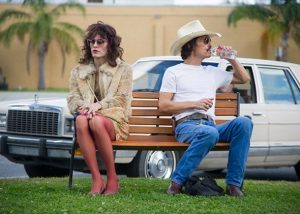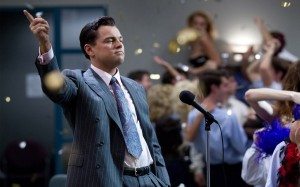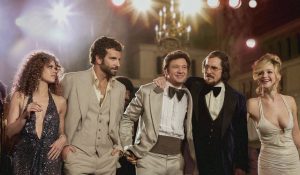
The 86th Annual Academy Awards are fast approaching, which means it's time to start making our predictions for who will be taking home the shiny gold man. Before the ceremony is broadcast on Sunday, March 2nd (you can watch the telecast on ABC starting at 8pm ET), we'll be examining every major category and ranking each nominee on their likelihood to hear their name called. Today’s category: Best Picture!
Best Director
Best Actor
Best Actress
Best Supporting Actor
Best Supporting Actress
Best Original Screenplay
Best Adapted Screenplay
 9. "Captain Phillips"
9. "Captain Phillips"Sadly, "Phillips" couldn't sustain the strong buzz it accrued early in its theatrical run, quickly losing steam in the face of splashier opponents. It now feels like the vast majority of Academy members have forgotten it exists. It's one of only two out of the nine Best Picture contenders to not have a nominee in either of the Leading Actor categories, director Paul Greengrass failed to secure a nod for Best Picture, and recent controversy surrounding the real-life Captain Phillips and whether or not he was responsible for putting his own crew in danger have dampened voters' enthusiasm for the hero and his film.
 8. "Philomena"
8. "Philomena"Judi Dench broke hearts as the guileless but courageous real-life woman who decided late in life to track down the son she had been coerced into giving up for adoption decades earlier. But she's so good that "Philomena" is really a one-woman show...and a Best Picture hopeful needs more than the strength of one terrific actor to achieve the status as the greatest film of the year.
 7. "Dallas Buyers Club"
7. "Dallas Buyers Club"Despite being a film that's recognized primarily for its acting, "Dallas" has managed to pick up a small groundswell of support late in the awards season. Most prognosticators didn't even have the film itself included as a Best Picture nominee (its slot was widely predicted to go to "Saving Mr. Banks", which wound up snubbed across the board). But with an unusually high number of strong contenders this year, the fact that "Dallas" is virtually a lock for not just one, but two acting prizes ironically hurts its chances in this category. Academy members are likely to feel that the film has been awarded enough, and cast their vote elsewhere.
 6. "Nebraska"
6. "Nebraska""The Descendants", from "Nebraska" director Alexander Payne, was a strong contender two years ago, although it ended up losing out to the retro silent film "The Artist". The director's latest effort is not as likely to take home the trophy as his last was, especially without the star power of George Clooney behind it. Nostalgia for Bruce Dern's long career may push the film ahead a bit, but nowhere near close enough to win. With a scant box office total of $16 million, "Nebraska" is the least-seen of all nine nominees, which certainly doesn't help.
 5. "Her"
5. "Her""Her" is the only Best Picture nominee with zero acting nominations, since Joaquin Phoenix lost out in an overcrowded Best Actor field and Scarlett Johansson's voice-only performance was deemed ineligible for consideration. So why is it ranked so highly? Critics raved over the film and, stodgy Academy rules about what constitutes a worthy performance aside, Johansson and Phoenix had some of the best (and strangest) chemistry this year as Theodore, a lonely writer, and Samantha, his artificially intelligent operating system. "Her" is the most unique of the nominees, and some voters were likely enraptured by Spike Jonze's quirky-future-world-building enough to place it high on their lists.
 4. "The Wolf Of Wall Street"
4. "The Wolf Of Wall Street"How does such a divisive film, the nominee with the lowest Rotten Tomato score (77%), end up at #4? When Academy members vote for the Best Picture award, they don't simply place a check mark next to their favorite film of the year -- they rank each nominee. There are plenty of "Wolf" detractors out there, but those who love it reeeally love it, which means lots of #1 rankings. Most of the nominees listed below "Wolf" are widely respected enough to garner lots of 4s or 3s -- or maybe even some 2s -- but likely not many 1s, which puts "Wolf" ahead of them (but still not high enough to come close to winning).
 3. "American Hustle"
3. "American Hustle"And now we enter true contender territory. "Hustle" burst onto the awards scene in mid-December, enrapturing its audiences with crackerjack performances, frenetic pacing, and ridiculous wigs. It quickly picked up steam, shoving aside "Gravity" as "12 Years"s fiercest competitor, landing Jennifer Lawrence a Golden Globe for Supporting Actress and winning Best Picture - Comedy at the same ceremony (alongside "12 Years", which won Best Picture - Drama). But that night, while a clear victory for the crime caper, was also its peak. That explosion of enthusiasm has since petered out a bit, allowing "Gravity" to sneak back into the race, and relegating "Hustle" to third place. It's now the least likely of the three frontrunners to win, although if it did win, it wouldn't exactly be an upset. Each of the frontrunners has a quick and easy label attached to it: "Gravity" is the "effects" film, "12 Years" is the "issue" film, and "Hustle" is the "acting" film...and actors make up the largest block of Academy voters, so dismiss "Hustle" at your own peril.
 2/1. "12 Years A Slave" / "Gravity"
2/1. "12 Years A Slave" / "Gravity"The race for Best Picture hasn't been this close since...when was the last time it was this close? I'm not sure anyone alive can even remember a competition as fierce as this. You could flip a coin and have as good a chance at predicting the winner as the most seasoned Oscar prognosticators in the business. So how do we determine a winner? First, let's examine the awards each film has already won. At the Golden Globes, "12 Years" won Best Picture - Drama, although it lost literally every other award it was up for, making it an uneasy victory. "Gravity" scored Best Director at the same ceremony, marking both films as winners without crowning a clear-cut champion. Next came the Producers Guild Awards, which is traditionally the best predictor of the eventual Oscar winner. In its 25 years of choosing a Best Theatrical Motion Picture, the PGA has correctly predicted the Oscar winner 17 times, including the past six in a row. So who did it choose this year? For the first time in its history, the PGA declared a tie between -- you guessed it -- "12 Years A Slave" and "Gravity". Very helpful, guys. At the BAFTA awards (aka the British Oscars), "12 Years" beat "Gravity" for Best Picture. So we have a winner, right? Not so fast. The BAFTAS also handed Best British Film to "Gravity" (which was eligible because it was shot in the UK with a British crew and had a British producer). The fact that "Gravity" got to compete in two Best Picture categories that night meant that voters weren't forced to make a tough decision. Both films won. Again.
Next, let's take a look at the other awards each film is up for at the Oscars. "Gravity" leads the pack this year with 10 nominations (tied with "American Hustle"), while "12 Years" is a close runner-up with 9. So that gives "Gravity" the edge. But most of "Gravity"s noms are in technical categories, while "12 Years" has a strong presence in the acting races, which gives it the edge. No help there. What about Cuarón's nearly inevitable Best Director win? Director and Picture usually go hand-in-hand, so that gives "Gravity" the edge. But with the two films in such a dead heat, perhaps the voters will want to spread out the honors and give Cuarón Director while awarding "12 Years" for Picture, like the Golden Globes. So no help there, either. On paper, the two films are virtually neck-and-neck.
 If we're going to make an informed decision, that will require examining exactly how the Best Picture winner is chosen -- it's not as clear-cut as you might think. You might assume that the film with simply the most #1 votes gets the trophy. Not so. A film has to have a majority of votes, which is why voters are required to rank their picks instead of simply choosing one: if no one film has a majority of #1 votes (which is likely in a year with so many strong contenders), then the film with the least amount of #1 votes is eliminated and its ballots are given over to their #2 picks. This is repeated until one film has over 50% of the ballots in its pile. This process is called a preferential ballot system, and it ensures that the eventual winner has widespread support. This means that in a tight race (like we have here), it is just as important that a film has #2 votes as it does #1s. And this is what the competition might come down to: "Gravity" is a widely-seen, crowd-pleasing film, and that gives it an advantage. Even if "12 Years" has more #1 votes, if it doesn't have enough to win in the first round, "Gravity" might pull ahead through sheer force of #2s. "12 Years" is a difficult film with controversial subject matter and intense violence; while the majority of critics loved it, there may be a swath of less vocal Academy members who were turned off by the film's brutality -- or perhaps felt too intimidated by the prospect to even see it, which means the film is more likely to be split between passionate support and low rankings. "Gravity" is an "easier" watch, and by far the highest-grossing film of the nine nominees (at $270 million, it's more than $100 million past "American Hustle" in second place), which means every voter is virtually guaranteed to have seen it. So even if "Gravity" has fewer #1 votes in the first round, it's entirely possible that the industry's admiration for Cuarón and his sci-fi epic will tip the scales of the preferential ballot system in that film's favor.
If we're going to make an informed decision, that will require examining exactly how the Best Picture winner is chosen -- it's not as clear-cut as you might think. You might assume that the film with simply the most #1 votes gets the trophy. Not so. A film has to have a majority of votes, which is why voters are required to rank their picks instead of simply choosing one: if no one film has a majority of #1 votes (which is likely in a year with so many strong contenders), then the film with the least amount of #1 votes is eliminated and its ballots are given over to their #2 picks. This is repeated until one film has over 50% of the ballots in its pile. This process is called a preferential ballot system, and it ensures that the eventual winner has widespread support. This means that in a tight race (like we have here), it is just as important that a film has #2 votes as it does #1s. And this is what the competition might come down to: "Gravity" is a widely-seen, crowd-pleasing film, and that gives it an advantage. Even if "12 Years" has more #1 votes, if it doesn't have enough to win in the first round, "Gravity" might pull ahead through sheer force of #2s. "12 Years" is a difficult film with controversial subject matter and intense violence; while the majority of critics loved it, there may be a swath of less vocal Academy members who were turned off by the film's brutality -- or perhaps felt too intimidated by the prospect to even see it, which means the film is more likely to be split between passionate support and low rankings. "Gravity" is an "easier" watch, and by far the highest-grossing film of the nine nominees (at $270 million, it's more than $100 million past "American Hustle" in second place), which means every voter is virtually guaranteed to have seen it. So even if "Gravity" has fewer #1 votes in the first round, it's entirely possible that the industry's admiration for Cuarón and his sci-fi epic will tip the scales of the preferential ballot system in that film's favor.
All of that being said, "12 Years" still feels like the more traditional Academy pick. It's the film that has stayed in constant competition while "Gravity" and "Hustle" have tag-teamed as its main opponent; it has the weight of history behind it; and it's no secret that the Academy generally prefers drama over spectacle. But while "12 Years" undoubtedly has the Academy's appreciation, "Gravity" has its awe. And in such a close race, that just might make the difference.
They say it's better to be safe than sorry, and "12 Years" is definitely the safe choice. I might regret it Monday morning, but after much deliberation, I'm going with the riskier option, because it will feel so much more gratifying if I end up being right.
What do you think will win Best Picture? Tweet us @Stagebuddy to announce your pick!